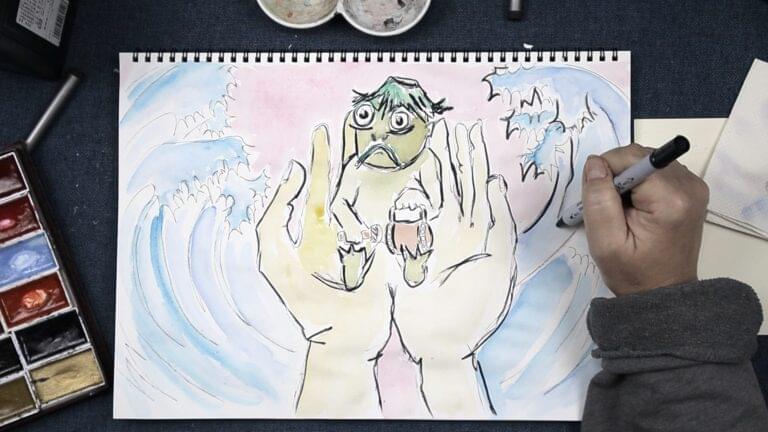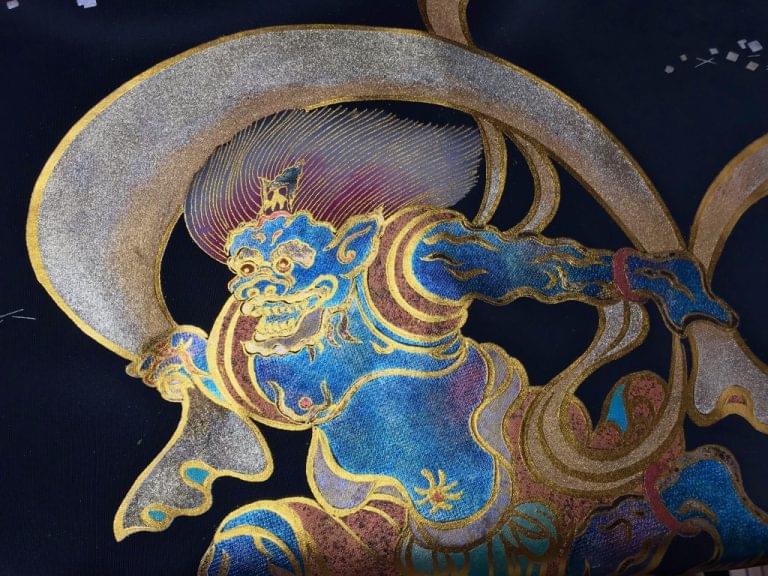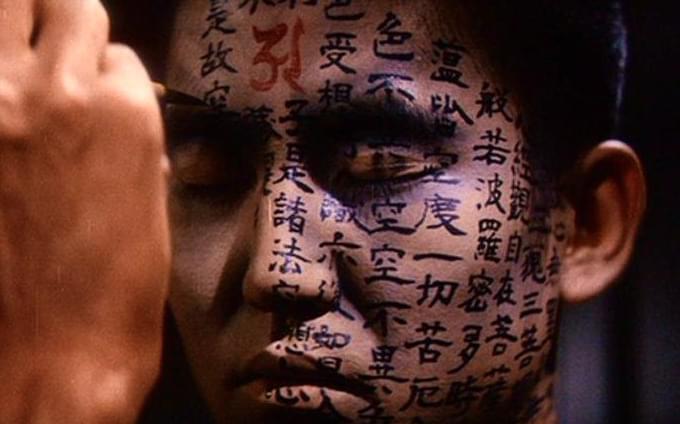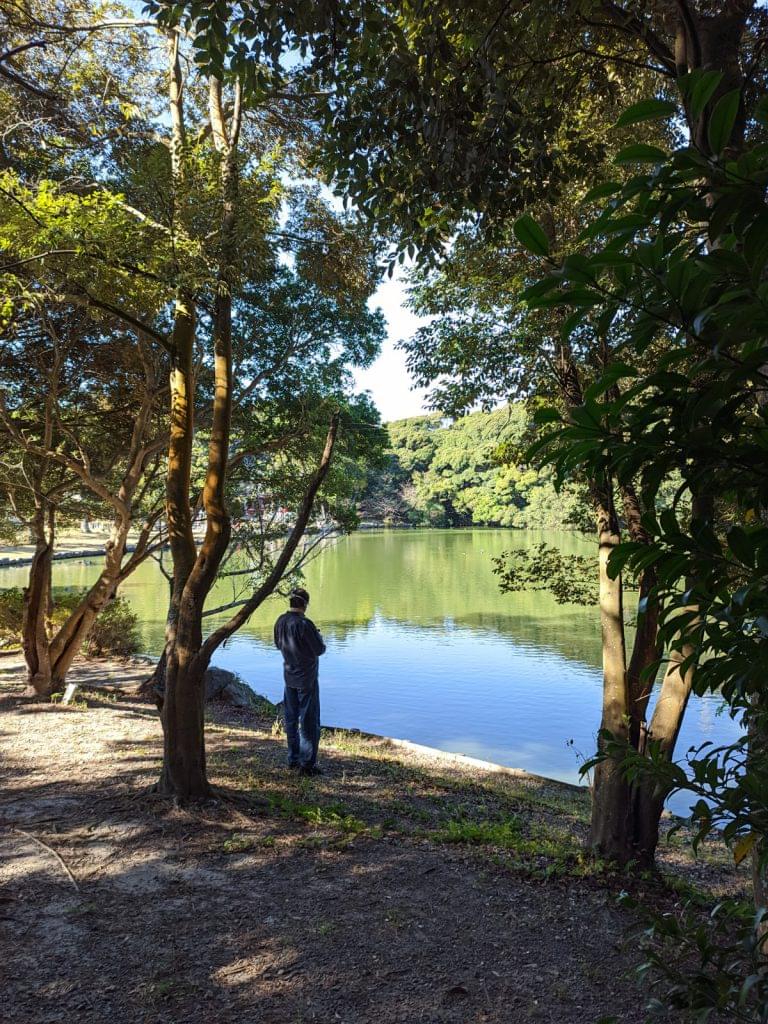We’re getting closer to Halloween. How about another ghost story? Ame-onna, the rain woman, is a haggard-looking thing, soaked to the bone, she’s seen wandering about on rainy nights. There’s some lore about her, some rumors, some theories, but she doesn’t have her own ghost story, so I fixed that.
Today, first I’ll tell you a bit of fascinating history about the Rain Woman, then I’ll read you my story, “Rain for Days”.
Hey, hey, I’m Thersa Matsuura and you’re listening to Uncanny Japan, where I tell you about all the more obscure, sometimes strange, sometimes spooky parts of Japan. I’m also the author of the book of Japanese folklore and, coming in November, the Yōkai Oracle deck.
Since it’s October and things are getting creepy maybe I should mention my collection of horror short stories: The Carp-Faced Boy and Other Tales. Please, be sure to pick up the audio book for two reasons: First, because that’s me reading the stories about oh, an ancient goddess who’s kept chained up in a hut in the mountains, but if you can find her you’ll get your wish for a child, but at a price. And two: I actually get paid a little bit when anyone purchases the audio version. I get absolutely nothing from the ebook or paperback sales. Zero. Zilch. Nani mo nai. And that’s the true horror of being an author right there.
This month, our network, Spectrevision Radio, is asking all the shows to do a special Halloween episode. I can’t wait to see what everyone does. For us here at Uncanny Japan, yep, we’ve got something scary planned, so stay tuned for that. And remember, ad-free versions of the shows are available to $5 a month and up patrons, along with other content, so you can check that out.
The Evolution of Ame-onna Through History
Okay, let’s learn a little bit about the history of Ame-onna before I tell you the story I wrote for her. It’s really interesting to see the evolution of this rain woman.
Toriyama Sekien’s Original Depiction
You’ll find her first in Toriyama Sekien’s book, Konjaku Hyakki Shūi, supplement to the 100 demons from the present and past. In it is a black and white depiction of a rain-soaked woman, very creepily licking her hand.
The inscription is interesting, too. Sekien writes, “It is said that the divine woman of Mount Wu in ancient China becomes a cloud in the morning and rain in the evening. I wonder if Ame-onna is also this kind of being.” This all sounds innocent, if not a little confusing, but there’s actually a lot going on in this description.
The Ancient Chinese Poem: Morning Clouds, Evening Rain
What he’s referring to is an ancient Chinese prose poem called Gaotong Fu. It was written by a famous poet named Song Yu in the third century BCE. In the poem, he tells of a story about King Huai, who visits the Gaotong shrine. The king is very tired and takes a nap there, while sleeping, though. He has the most vivid dream of a woman of breathtaking beauty appearing before him. The king asked who she was, and she told him that she was the goddess of Mount Wu. After that, they shared a very meaningful and lovely bit of intimacy. Then the mysterious goddess had to leave.
Before parting, she told the king, “In the morning I shall be a cloud. In the evening I shall be rain. Morning and evening I will be there below the Yang Terrace.” She was saying that as a goddess, she could never be possessed. She was as fleeting as the weather, but if the king returned to the shrine, he could see her again in the form of clouds and rain.
From this story came the Japanese four character idiom, Chōun-bōu, or “morning clouds, evening rain.” And that, my friends, is a clever code for the much less poetic phrase, “hooking up,” or a secret and fleeting love affair. It’s a bit rare today, something you’ll find in historical texts or novels or old samurai flicks, maybe even some old song lyrics. It’s very beautiful.
The Courtesans of Yoshiwara
All that to say, the artist Toriyama Sekien was kind of comparing that story, the morning clouds, evening rain, to his depiction of the Ame-onna and wondering if she was the same type of being. But as he sometimes did, he was most likely secretly referring to the courtesans of Yoshiwara. Much like the goddess in the poem, these courtesans were ephemeral, possibly great beauties and not able to be held onto.
This is a guess, but Sekien, because he’s got such a great sense of humor, is showing an ironic juxtaposition between the goddess having a tryst with the king and common courtesans whose clients were most likely merchants or samurai. So perhaps instead of mocking the women of the pleasure quarters, he’s elevating them as tragic beauties who cannot be held by any one man. I don’t know. That’s just a guess.
The Transformation: From Courtesan Metaphor to Grieving Mother
That was then. That’s how Toriyama Sekien introduced this ghostly yōkai. But things change over time, and there became stories of women who lost their children on rainy nights. And by lost, I mean the children were spirited away or taken by kamikakushi, never to return again. The poor mothers were so full of grief that they turned into Ame-onna and walked the streets on rainy nights carrying a large sack. They’re said to be searching for their stolen child.
So when an Ame-onna hears a crying baby, they hurry over. In Nagano, it’s said they also kidnapped children. I guess that’s what the bag is for. There are some tales of them being a type of god bringing rain or a fallen god sneaking around snatching up babies. So you can see there is quite a bit written about the Ame-onna, but no actual story. So let me take care of that for you.
Rain for Days: An Original Ame-onna Story
Rain for more than a day always made everyone in the house nervous, especially Okā. The kids were wild with pent up energy, feral little beasts who sensed they were trapped and knew that there was nothing they could do to escape. Everything from the latticed papered windows, to the straw mats, to the stagnant heavy air grew uncomfortable and much too close.
But the real horrors came out after dark. Yellow-toothed rats driven from their waterlogged homes scurried along the rafters, while hand-sized spiders appeared suddenly in a corner, only to vanish a moment later. But it was the giant centipedes scuttling from the woodwork or from under a discarded rag that really had the power to stop the heart and make a little boy howl.
It was strange those rainy days. Where the smell of mildew and the sour stink of daikon pickling in clay jars grew stronger, but the constant zaa-zaa on the roof tiles swallowed all the smaller sounds that kept a boy alert and prepared for real danger. Like the footsteps of brothers sneaking up on him to steal a toy or the barking of the stray dog that lived under the house next door, alerting that a stranger was approaching.
Through it all, though, was the monotonous dripping of water from the entryway ceiling into a ceramic bowl. Pota. Pota. Pota.
Jiro’s Tantrum
“Saburo did it!” Jiro, the middle child, screamed and thrust his paper pinwheel with the recently snapped bamboo handle into Okā’s hands.
Mother looked at Saburo who sat in the oldest, Taro’s, lap with his fat, red splotched cheeks and green-snotted nose, looking stronge and healthy and cute. She turned back to Jiro with a withering look.
“I’m sure it was an accident,” her voice weary. “We’ll fix it.”
Jiro threw back his head and wailed. He was too old for this behavior. But here it was again, the unfairness and why didn’t anyone listen to him anymore? Ever since Saburo arrived three years ago, Jiro’s position in the house had been completely toppled. There was no place for him anymore.
“Shh, quiet,” Okā urged.
Jiro no longer had any control over his life, over himself even. Nothing was going to change. He might as well end it now. The boy sucked in a chest full of air, pursed his lips, and held his breath.
“Don’t do that,” Okā said. She looked pleadingly to Taro who shook his head, scooped up Saburo, and stood.
Jiro didn’t want to live in this stupid house anyway. He swayed a little for dramatic effect. Bugged his eyes. Resisted the urge to breathe.
“Do you want to hear a story?” Taro asked the breaker-of-toys, the ruiner-of-harmony. As they padded down the hall to the back bedroom, Jiro heard Taro talk about Peach Boys and undersea dragon castles. Those were the stories his big brother used to tell him not so long ago. Those were his stories. Jiro tensed up.
Pota. Pota. Pota.
The raindrops slowed way down until they matched the pounding in his temples. Everything went black. When he came to, he was on his side. Frightened that he’d almost done it, he started yowling even louder than before.
“Quiet. You’ll call her. ” Okā who was by his side left him and hurried to the window. She opened it. The sound of rain filled the room, a wash of cool air.
His mother gazed out with that worried look she saved for when Tō-chan was supposed to come home from one of his trips, but was several days late. But that didn’t make sense. He’d just left and wouldn’t be home for a long time.
Okā’s Warning About the Rain Woman
“She who?”
“Ame-onna.” Okā hissed the words through her teeth.
“The Rain Woman? Who’s that?”
Okā shut the window — closing in the room around them again — and came to sit close her middle child.
“A horrible wretched thing,” she said, using the cuff of her robe to dry Jiro’s eyes. “Ame-onna only appears on rainy nights. Her torn kimono soaked through, her hair clinging like slimy seaweed down her face and neck and back. She walks up and down the streets listening for crying or misbehaving children.”
“Why would she do that?” Jiro studied his mother’s wide-eyed face for any sign this was a funny story in disguise.
“She used to be a normal mother, pretty and young and kind.” Okā stroked Jiro’s hair.
“She only had one child, a daughter, who she loved very much. But when she was still a baby, the mother lost her husband to an illness and had to raise the child alone.”
“One night she was returning home after dark when it started to downpour. She took shelter under the eaves of an old temple to wait it out. The mother untied the baby she had swaddled to her chest and laid her down on a dry spot so she could adjust her own kimono. It was only a second she took her eyes off her daughter, but when she reached down to pick her up again, she found the blanket was full of leaves.”
“Kamikakushi?” Jiro bounced a little. He loved stories about tengu stealing children and taking them to faraway magical lands.
“Not exactly ‘hidden by the gods’,” Okā said. “She was so panicked and scared, she searched everywhere.” Mother acted out the scene, looking quickly around the room, under a zabuton cushion, inside Jiro’s shirt. The boy giggled.
“The mother found her, right? Her baby.”
Okā shook her head. Jiro felt an itchy disquiet in the pit of his stomach. Stories didn’t end this way. He waited.
Pota. Pota. Pota.
“W-what happened?”
“She didn’t sleep anymore. She didn’t eat. She just kept looking everywhere for her beloved child. The days went by, the months, the years. She grew fainter and fainter.”
“She became a ghost?”
“A kind of ghost.” The glint in Okā’s eyes turned hard. Her voice lowered. “She never stopped. She became filled with desperation and rage. They say she appears on rainy nights, walking the streets, dragging a sack behind her, listening for any sound of a crying chid. It might just be her little girl.”
“Why does she have a sack?” Jiro knew he wouldn’t like the answer to his question.
“Oh, because all the children she comes across acting out aren’t her daughter. So she grabs them up and stuffs them in the sack to take away into the night.”
Jiro felt a whine building in his throat. Okā must have heard it too. She reached over and pinched him hard on the thigh.
“Although some say she’s gone mad and just likes to collect nasty little children to whisk away.”
Pota. Pota. Pota.
Jiro looked into his mother’s eyes. He couldn’t read her emotion. He smiled, but she didn’t smile back. He rubbed his leg.
Seeing the Rain Woman
“Come here, if you think I’m kidding.”
Okā grabbed the handheld te-andon and carried it to the window. The soft flame behind the washi paper trembled as she opened it and leaned outside. Jiro followed.
“Over that way,” she motioned with the lamp, careful not to point, then handed it to him.
It was difficult to see past the water cascading off the extended eaves. Everything beyond the golden glow of the lamp was inky black. The forest behind the house an unfathomable nothingness where all the very worst things in his imagination waited. Jiro looked harder.
Then he saw her, the outline of a woman. He squinted. He wasn’t sure, but it did look like she was gripping something in one lowered hand. But there was movement with her other arm. She was doing something.
“I see her,” he whispered and leaned farther out the window.
Jiro focused so intently, he didn’t notice his mother moving away from his side and blowing out two of the candles, preparing for sleep. What he did see was the corpse-like woman licking the back of her free hand with her long black tongue. Over and over from her wrist to her fingertips. She stopped.
Pota. Pota. Pota.
Her head swiveled in Jiro’s direction. The boy jumped backwards away from the window, a slosh of oil drowning out the wick in the lamp.
When his attention returned to the room, he found his mother at the hard wooden-floored tokonoma alcove leaving only a single flickering lamp, under the hanging scroll.
Jiro started to cry.
“Quiet!” Okā said, frustration and disappointment heavy in her voice. “What did I tell you?”
Jiro didn’t like losing control. But he couldn’t help it. His emotions were always boiling around him, ready to surge. He scampered over and buried his head in a zabuton, hoping to muffle his cries. He heard the quick damp steps of his mother’s feet racing across the tatami to close the window. The room sealed up around him again. The screaming rain shut outside. Safer. The musty smell and the rough feel of the cloth on his face helped him work through the sobs. After a moment, Okā came over and ran her fingers through his hair. It tickled, prickling his skin on the back of his neck and made him laugh. He waited for her to say something, to pick him up and put him in her lap.
Pota pota pota.
The room grew still. A fist seized in his stomach when he half-remembered that sometime during the tantrum he had heard the door to the hall open and shut. Okā had gone to bed. He was alone. A cold movement of air made him shiver. Not alone.
The Encounter
Jiro bolted upright. The only light was the steady glow coming from the tokonoma. The first thing he noticed was that the window was open. But he’d heard his mother close it. He reeled around. The second thing he noticed was the dark stain spreading across the tatami floor in front of the alcove. He looked up. Mixed in with the long stuttering shadows of the vase filled with silver grass was the figure of Ame-onna, a sketchy outline growing clearer the more he looked.
He wanted to scream, but fear had stolen his voice. The house was so still, the way it got when everyone was asleep.
The Rain Woman was hunched, shivering. Her long thinning hair, clung to her skin and torn robes. The bruised skin under her ember-lit black eyes sagged revealing the bone underneath. Her mouth, unable to close, hung open, quivering as she worked the oversized, slug-like tongue. She was trying to talk. Jiro was overcome with not terror, but sadness and pity for this poor mom. Her grief filled the room, threatening to drown him.
Pota pota…picha.
Something mewled and brought his attention to the large roughly hewn bag resting on the floor by her side. Inside something rolled over, thrashed out, a whimper and weakened cries.
The children. She wasn’t so bad. Maybe she was going to take them some place where they didn’t have to deal with brothers and fighting for the bigger piece of grilled river fish. Certainly, it was a better life, he told himself. Maybe all the children were free to do as they wished.
Picha. Picha. Picha.
The water in the bowl must be nearly at the top now. The higher tone sounded faster, more urgent.
Ame-onna still stared down at him, unblinking, her throat strangling to speak. She reached out with one long arm and ran her boney fingers through his hair. His neck prickled again.
“I understand,” Jiro said. He scooched back away from her. “I know what you want.”
When he reached the door to the hallway, he stood.
“Wait here. I’ll bring you a baby for your bag.”
The end.
Thank you for listening, I’ll see you again on Halloween.






